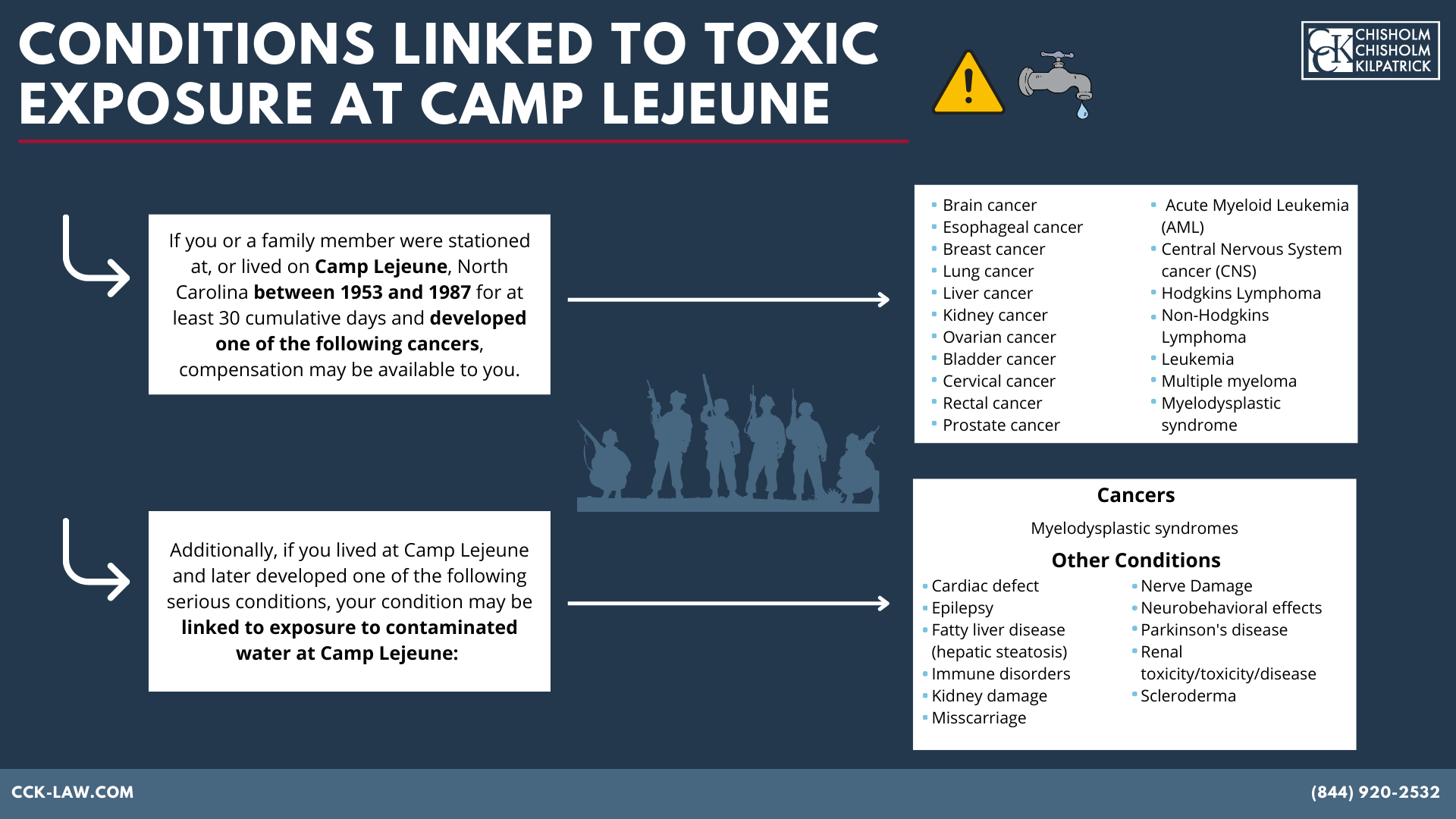Benefits for Family Members of Veterans Stationed at Camp Lejeune

CCK Law: Our Vital Role in Veterans Law
Veterans and their families living at U.S. Marine Corps Base Camp Lejeune, North Carolina between August 1, 1953 and December 31, 1987 may have been exposed to contaminated drinking water containing chemicals thought to cause adverse health effects.
Exposure at Camp Lejeune
Those who were stationed, worked, or lived at Camp Lejeune between 1953 and 1987 were possibly exposed to dangerous and toxic chemicals that existed in the tap water.

Testing found that drinking water sources at Camp Lejeune were contaminated with:
- Benzene
- Trichloroethylene (TCE)
- Tetrachloroethylene
- Perchloroethylene (PCE)
- Vinyl Chloride (VC)
All these contaminants are known to be carcinogenic, or harmful to humans. Although officials were aware of the water contamination at Camp Lejeune, they never addressed the problem. For decades, veterans, their families, and others who resided or worked at Camp Lejeune were exposed to toxic chemicals, many of whom subsequently developed cancer or other life-threatening diseases.
Conditions Linked to Exposures at Camp Lejeune
If you are a family member of a veteran and lived at Camp Lejeune between 1953 and 1987 for at least 30 cumulative days and developed one of the following cancers, compensation may be available to you:
- Acute Myeloid Leukemia (AML)
- Bladder cancer
- Brain cancer
- Breast cancer
- Central Nervous System cancer (CNS)
- Cervical cancer
- Esophageal cancer
- Hodgkins Lymphoma
- Kidney cancer
- Leukemia
- Liver cancer
- Lung cancer
- Multiple myeloma
- Myelodysplastic Syndrome
- Non-Hodgkins Lymphoma
- Ovarian cancer
- Prostate cancer
- Rectal cancer
In addition, those who lived at Camp Lejeune may have developed one of the following serious health conditions, which are linked to exposure to the contaminated water:
- Cardiac defect
- Epilepsy
- Fatty liver disease (hepatic steatosis)
- Female infertility
- Immune disorders
- Kidney damage
- Miscarriage
- Myelodysplastic syndromes
- Nerve damage
- Neurobehavioral effects
- Parkinson’s disease
- Renal toxicity/toxicity/disease
- Scleroderma
How Can the PACT Act Help Family Members Exposed at Camp Lejeune?
The PACT Act is a monumental piece of legislation that was passed to provide aid and further benefits to veterans, and their family members, who were exposed to toxic substances during their military service, such as herbicides, burn pits, and more.
In regard to those exposed at Camp Lejeune, the PACT Act has created a federal cause of action for any individual, including veterans, who resided, worked at, or was otherwise exposed to Camp Lejeune’s water for at least 30 days between August 1, 1953 and December 31, 1987.
This means that anyone who meets these criteria may bring a claim to the United States District Court for the Eastern District of North Carolina to obtain compensation for harm that was caused by the exposure. Compensation awarded in Court may be subject to offsets for federal benefits the individual receives for the claimed condition, such as VA or Medicare benefits for a condition caused by Camp Lejeune exposure.
The statute of limitations for bringing action before the Court is two years after the passage of the PACT Act or 180 days after an individual’s claim is denied.
What Benefits Am I Entitled to as a Camp Lejeune Family Member?
Additionally, healthcare benefits are provided to qualified Camp Lejeune family members who have developed certain conditions as a result of contaminated drinking water at Camp Lejeune under The Honoring America’s Veterans and Caring for Camp Lejeune Families Act of 2012.
VA defines the area of Camp Lejeune to include anywhere within the borders of U.S. Marine Corps Base Camp Lejeune or Marine Corps Air Station New River.
VA provides reimbursement for out-of-pocket healthcare costs for veterans’ family members, including children in utero, who resided at Camp Lejeune between August 1, 1953 and December 31, 1987.
To be eligible for medical cost reimbursement, family members must have been living at Camp Lejeune for a minimum of 30 days cumulatively during the aforementioned time frame and must have developed one of the 15 qualifying health conditions listed within the next section of this post.

What Type of Evidence Should I Provide to VA to Take Part in the Camp Lejeune Family Member Program?
In order to receive reimbursement for costs incurred during the treatment of a qualified condition listed above, you must first apply to the Camp Lejeune Family Member Program by completing VA Form 10-10068: Camp Lejeune Family Member Program Application and submitting it to VA, or you can do so online. VA will require you to submit evidence proving your eligibility for the program, such as:
- Marriage license or birth certificate that shows a dependent relationship to a veteran who was stationed at Camp Lejeune.
- Proof that you lived at the base for at least 30 days between August 1, 1953 and December 31, 1987. Such proof can include base housing records, military orders, utility bills, or tax forms.
- Medical records proving that you paid medical expenses for one of the qualifying conditions above, “respective to the following date ranges”:
- Dependents who lived at Camp Lejeune between January 1, 1957 and December 31, 1987 can be reimbursed for out-of-pocket medical expenses incurred on or after August 6, 2012;
- Dependents living at Camp Lejeune between August 1, 1953 and December 31, 1956 can have medical expenses incurred due to a qualifying condition reimbursed for care received on or after December 16. 2014.
- VA Form 10-10068b: Camp Lejeune Family Member Program Treating Physician Report completed by your doctor.
About the Author
Share this Post

